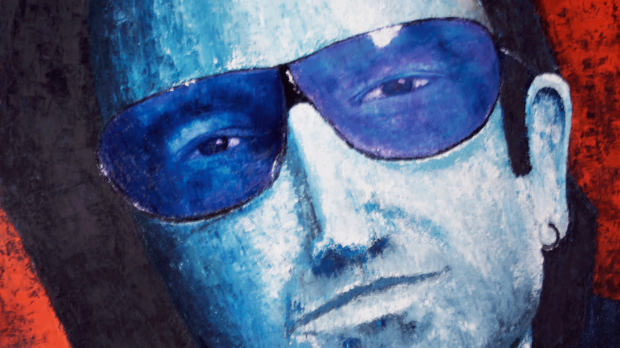At one point during a
U2’s frontman Bono — speaking with David Taylor, assistant professor of theology and culture at Fuller Theological Seminary — says, “I became an artist through the portal of grief.” Watch here:There is lots of good stuff to unpack, there, particularly the information that Bono and his family went to Jerusalem “on a family pilgrimage” and that he came to an understanding of death while standing at the place where Christ Jesus was crucified — “the place where death died,” as he says — that has forever changed his outlook on death.
His bringing up his mother’s death, though — she suffered a stroke at her father’s graveside, when Bono was 14 — reminded me of a mystery I have pondered often: how much does the early loss of a parent (or, in some cases the emotional abuse and abandonment of a parent) factor into the lives of prominent people, particularly artists, particularly those artists who sometimes seem to go out of their way to bring attention to themselves, even outside of their work? I’m thinking of artists like John Lennon, whose mother surrendered custody of him when he was very small and died while he was a teenager, or Madonna, Ray Charles, and Rosie O’Donnell, all of whom — like Bono, and also like Paul McCartney — lost their mothers in adolescence; or Frank Sinatra, who confessed himself terrified of a mother who alternatively coddled him and beat him. Or Marilyn Monroe, who was a ward of the state by the time she was seven years old, and seemed to spend her whole life looking for validation and love.
I recall watching Sinatra in concert in the late 1980’s — using monitors to help him remember the lyrics to songs he’d sung thousands of times — and wondering, “What is still missing from his life that he needs to keep seeking out the love of the masses, the audience applause?” He had formally “retired” in 1971, only to go back onstage a mere two years later. John Lennon “retired” to raise his son, Sean, but was never fully out of sight before creating his last album. Paul McCartney is 74 and one of the wealthiest men in Britain, but he’s touring again this summer. Madonna hasn’t had a hit record in years — she hasn’t really been interesting in years — and yet she keeps inserting herself into events in outrageous and annoying ways for no discernible reason beyond a need for attention. She, like O’Donnell, and Bono, has brought up the loss of a mother frequently in past interviews. Clearly, it weighs.
“She left me,” Bono says of his mother’s death, “but she left me an artist.” How large a part of artistic expression, whether music, cinema, arts and letter, has its genesis in loss, and the need to find a way to fill the void left by grief with something else, something that tells the tale and finds the validation denied via absent parentage?
“It began the journey, trying to fill the hole in my heart…”
“Finally,” says Bono, here, “the only thing that could fulfill it was God’s love. And it’s a big hole, but luckily it was a big love.”
It is staggering to think of how many people who have lost a parent early come to prominence — today is John Paul II’s birthday; he lost his mother early, too — and to wonder how much of their ambition (for good or for ill, for better or for worse) traveled through that “portal of grief”, had a connection with that need to fill the void of loss.
I have recently been pondering the history of England and its colonialist establishment, it’s empire-building, and I can’t help but note that so much of it was forged by sons of privilege who were sent away for schooling at very early ages.
It’s fascinating to think about, isn’t it?
“Our hearts are restless, until they rest in you,” wrote Saint Augustine, who was sent away for schooling at age 11, and lost his father at age 17. He knew the void.
We live in an age where more people are being born to single mothers than ever before; where divorce has ruptured families and relationships to parents; how many millions are looking to fill a void — the big hole that drives so much of what we do, either consciously or subconsciously — and are being directed away from that “big love” of God, which alone can fill it, and toward what is only false, full of empty promise, tempting endless appetite?
Just thinking about it makes me want to remember to pray for them, for the parent-grieving multitudes (and maybe for my own parent-grief) every day.

